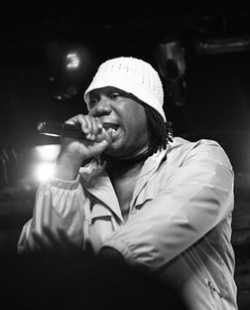| |
Taken from Orlando Weekly (April 13, 2016)
Class is in session with KRS-One, the scholar of hip-hop
Concert preview
by Nick McGregor

Photo by Chris Gaor |
Afrika Bambaata is widely regarded as the Godfather of hip-hop, and many consider Kool Herc to be the original King, but there's one undisputed superlative: KRS-One is the Scholar. Born Lawrence Parker in the Bronx in 1965, KRS-One (which stands for "Knowledge Reigns Supreme Over Nearly Everyone") committed himself and his first group, Boogie Down Productions, to an outspoken form of political activism and advocacy from the very start.
This mirrors Parker's commitment to the craft: He left home at age 16 to pursue his hip-hop dreams at a time when no one was making a full-time living at it. He ended up in a South Bronx homeless shelter, where he met youth counselor Scott Sterling, who decided to back him in Boogie Down Productions as DJ Scott La Rock. The duo's first album, 1987's Criminal Minded, set the template for hard-core hip-hop, with Scott sampling everyone from James Brown to Billy Joel to Jamaican dancehall music, and KRS publicly battling hip-hop dignitaries Marley Marl and MC Shan over hip-hop's true birthplace (Marl claimed Queens, KRS claimed the Bronx). Even more seminally, Scott and KRS appeared on the cover brandishing firearms and ammunition, a first in the popular music world.
But their posturing was meant to skewer the violence and drugs plaguing African-American communities, and to satirize white America's fetishization of it. In 1988, Scott La Rock was gunned down in a random street shoot-out, followed months later by the death of a fan at a KRS-One and Public Enemy concert. That jeopardized Boogie Down Productions' future and torpedoed a record deal with Warner Brothers, but KRS persevered, starting the nonprofit group Stop the Violence and pivoting toward conscious, epistemological hip-hop on crucial BDP albums Ghetto Music: The Blueprint of Hip-Hop and Edutainment.
In the '90s, KRS-One went solo, expanding his profile exponentially: a guest spot with alterna-rock heroes R.E.M., a fawning tribute from Sublime and a remix with Puff Daddy. But mainstream attention didn't fit KRS well, and today his early solo period is more well-known for the "WOOP WOOP" refrain of racial profiling anthem "Sound of da Police," the criminal justice reform crusade "Free Mumia" and a lengthy anti-corporate feud with the BBC.
Since then, KRS has focused on promoting hip-hop at every opportunity. He founded the Temple of Hip-Hop Ministry, Archive, School and Society to perpetuate Afrika Bambaata's overarching idea that the art form was a deliberate attempt to effect positive change on the world. He worked as an A&R executive at Warner Brothers and Reprise to try and recruit young conscious rappers into the major-label fold. He wrote a 600-page religious treatise called The Gospel of Hip-Hop. And today, he spends just as much time lecturing at colleges and dissecting police brutality on cable news as he does performing. "I introduced the concept of being hip-hop, not just doing it," he told the AV Club way back in 2001. "The concept of rap as something we do, while hip-hop is something we live ... that's the single most important contribution that I can offer. I make intelligence cool. I make spirituality cool. If we can make one's devotion to God cool, then I think I did a great thing. I can rest in peace."
|
|